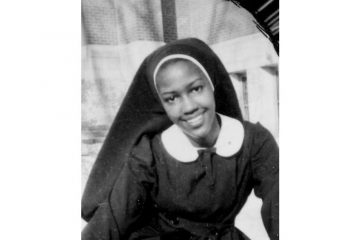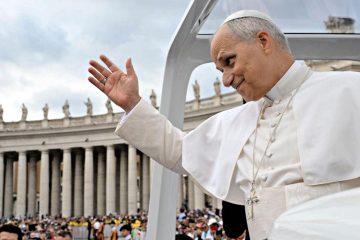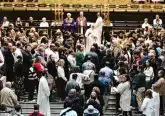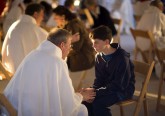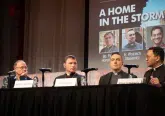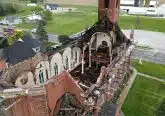Northern Area Congress focuses on family
Wednesday, September 29, 2010
By Eileen Connelly, OSU
SIDNEY DEANERY — The 35th annual Northern Area Congress, sponsored by the Archdiocese of Cincinnati’s Northern Area Office of Evangelization and Catechesis was held Sept. 18 at the Upper Valley Joint Vocational School in Piqua.
Approximately 250 catechetical leaders, youth ministers, Catholic school teachers, principals and others gathered for the daylong event, which was geared toward skill development, spiritual growth and enrichment. The theme for the day was “Family: The Missing Piece in Catechesis.”
 |
| Joseph White (Courtesy photo) |
In his keynote address, Joseph White addressed the importance of family in the church and catechesis specifically, speaking about the accompanying challenges and offering suggestions for ministering to families more effectively.
White is a clinical psychologist and director of family counseling and family life for the Diocese of Austin, Texas. He has taught courses in catechetics and pastoral guidance at the University of Dallas and University of St. Thomas in Houston. He is the author of seven books and numerous articles on catechesis and ministry. White is also the co-author of the new “Allelu” catechetical program and a national consultant for Our Sunday Visitor.
White encouraged participants to take a moment for self-reflection and consider how their own families formed them in faith and what they learned about God in that setting. He noted that “family is the key to the basic mysteries of our faith,” citing the Catechism of the Catholic Church and various sources scriptural sources that support this.
“God reveals himself as parent, so every mother and father is called to be an icon of God,” he said. “Too often, we still think of God as the cosmic judge or the policeman in the sky, but Jesus reveals God as parent and parents are the first experience of faith for their children.”
Too often, said White, the parish or catechists take on too much responsibility in forming children in their faith, when it is actually the parents themselves that are the primary catechists. He acknowledged that there are many challenges to engaging the modern family in catechesis, including hectic schedules, secularization of our culture, adults who are poorly formed in their own faith and a cultural fear of commitment.
To meet such challenges, White made note of particular “evangelizing moments” that can help families make the connection between faith and family life, including normative or development milestones such as a wedding or the birth of a child; spiritual milestones like baptism, first Communion and confirmation; and special circumstances such as a death in the family, divorce or times of financial need.
“It’s times when people are hurting most that the church needs to be there for them,” White said.
He also emphasized that there are every day moments that can connect families with their faith, from sharing their stories with each other to sharing a meal.
“Does a meal really make that much difference?” White said. “Ask Jesus Christ. He put a meal at the center of our faith. We can help families make a connection between the family meal and the eucharistic meal we have at Mass.”
White stressed the importance of the family meal and noted research which shows children and teens who have frequent family meals are at half the risk for substance abuse compared to young people who dine with their families infrequently. They are also more likely to say their parents are proud of them and they can confide in their parents are likelier to get better grades in school and to have positive peer relationships.
There are other natural opportunities for families to nurture their faith, White said. For instance, after watching a television show or movie, parents can discuss its message with their children, or while shopping, families can take justice issues to heart, considering those who have less when making purchases and buying fair trade items.
How can catechists help? They can encourage a resurrection of the family meal, White said, offer family-friendly adult faith formation and provide prayer resources or discussion questions to assist families in making a connection to their faith in the midst of their daily activities.
Catechists can also assist families by helping them “plug in” to parish or school religious education opportunities via personal conversations, newsletters, websites, email and putting the responsibility for catechesis on parents. “The church teaches that parents are the first and foremost teachers of their children and no one can replace that role,” White said.
Essential to this, he said, is offering events that truly bring families together and offer ritual experiences, such as pet blessings, festivals of saints or family faith festivals. Events of this nature are “important for their family and faith life,” White said.
Evangelizing the family can be a “daunting challenge,” White said, and he encouraged participants to turn to prayer for guidance. “God bless you and thank you for all the work you do as catechists,” he said in concluding his presentation.
After the keynote address there were workshop sessions allowing each participant to choose three workshops from a total of 34. Each workshop was recommended for certain areas of interest and for teachers or catechists of various age levels, as well sacramental preparation, education and worship commissions and general adult enrichment. Offerings included “New Avenues to Leading Teens to God and His Church,” “Creative Teaching in the Classroom,” “Connecting Adolescents and Prayer,” and “Technology in Catechesis.”
During lunchtime, participants were able to review the newest religious education and spiritual resources as they browsed displays by publishers, religious bookstores and archdiocesan offices.




